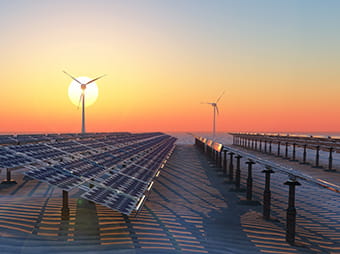If rising global temperatures worry you, you’re not alone. Frustrated that fossil fuels still account for around 80 per cent of the world’s energy consumption, thousands of homes have invested in combined solar-battery storage systems. And that figure is expected to grow to 1 million in Australia alone by 2020. But is going off-grid really the most sustainable choice a consumer can make?
As renewables become affordable, more and more people are cutting their wires and adopting a minimalist lifestyle – particularly in rural areas where the cost to connect to the grid is high. For city dwellers, however, powering our lives in this manner isn’t cost-effective given the home-ground (i.e. ‘sunk cost’) advantage the existing grid has over emerging technology. Living off the grid and expecting the same reliability (99.999%) requires a huge amount of equipment, even for one household.
A reliance on the sun and limited battery storage makes it difficult to meet typical evening peak energy needs unless you’re happy to go without a television, a fridge and washing machine. Today’s batteries last 10 years before needing to be replaced… and then discarded.
With the carbon impact of manufacturing, supplying and disposing of these batteries – how environmentally friendly is this, really?
All the while, the rest of us who are still connected to the grid are reducing our energy consumption by changing wasteful behaviour and using energy-efficient appliances. For energy utilities, this means an oversupply of capacity and lower revenues. Big spending on distribution system upgrades in the last decade has compounded their woes.
It’s time to accept the fact that the energy industry has been disrupted. If the trend towards going off-grid continues, are we dangerously close to setting off a chain of events whereby existing assets become white elephants – stranded and worthless? Or is there another way?
What do smart businesses do when they’ve been disrupted? They go back to the drawing board and find a way to disrupt the disruptors!
Have we reached a tipping point for utilities to start repurposing the grid and changing their business model? People are likely to continue installing solar cells, even as government subsidies reduce, until such time as the grid decarbonises. If the grid doesn’t use fossil fuels, then there is limited incentive for people to move to household level renewables.
Founder of Global Sharing Week, Benita Matofska says: “Traditional businesses can either fly-the-flag for the status quo and go down with it, or they can be smart about it and enable a new way of thinking, living and doing sustainable business. Those who do will survive and thrive.”
Just one of the opportunities for energy utilities derives from the notion that household renewable assets needn’t always be consumer-owned. Companies like SolarCity are emerging, which provide solar panels that you can lease rather than buy. Should energy utilities focus on looking for ways to work with start-ups to facilitate the roll-out of solar and storage at scale?
 And who said that the renewable energy generated by each household can’t be shared? Imagine subscribing to energy via a sharing platform and using an app to trade energy with other people and businesses.
And who said that the renewable energy generated by each household can’t be shared? Imagine subscribing to energy via a sharing platform and using an app to trade energy with other people and businesses.
To make this future smart city scenario possible, we need to continue to invest in emerging technologies, to commercialise the ones that show promise, and to optimise the ones we already know work well.
Tesla’s PowerWall is today’s high profile home battery storage product, but there’s no shortage of players lining up to compete, ultimately putting downward pressure on costs, which will drive further mass market appeal and adoption of these smart solutions.
And let’s not forget the power of community... we need only look at today’s smartest cities for inspiration. The successful citizen solar power plants initiative – a partnership of Vienna, Austria and Wien Energy – offered locals the opportunity to invest in the city’s solar plants to help achieve its renewable energy objectives.
The switch to renewable energy has already been flicked. Smart utilities that are willing to drive change toward a cleaner future will prosper – but it’s going to take the turning off of a lot of old paradigms to do so.
This blog was authored by: Victor Young




